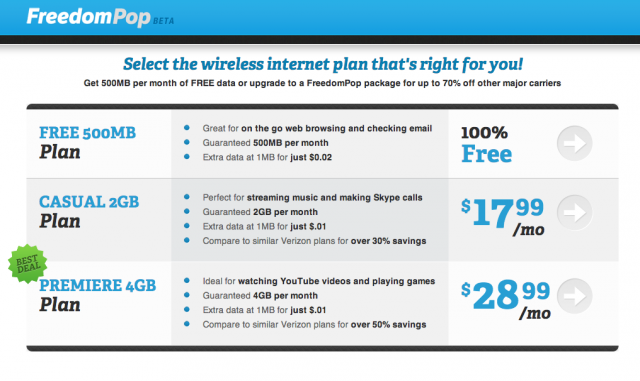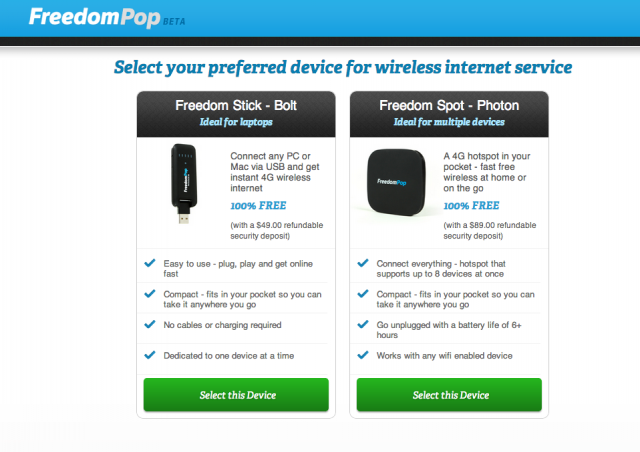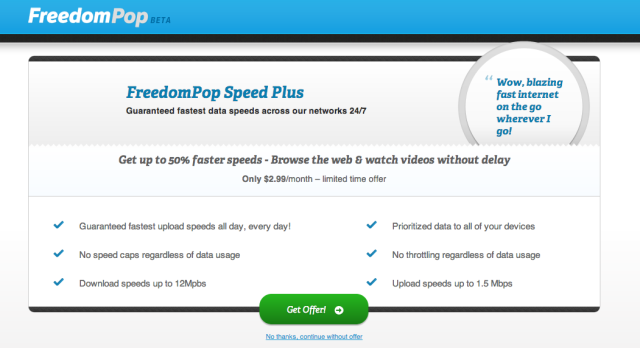
Stephen Stokols is a man on a mission—to do nothing less than shake up the entire mobile phone industry.
"We are actually explicitly trying to disrupt a $100 billion business," the CEO of FreedomPop told Ars this morning.
On Monday, FreedomPop finally launched with its public beta, bringing cheap (if not free) mobile data across the United States. The company is backed by Atomico, a venture capital firm founded by Niklas Zennström (the Swedish co-founder of Skype). FreedomPop offers up a freemium model that could potentially allow mobile users to get rid of their carrier entirely. This summer, FreedomPop secured $7.5 million in venture capital funding. Analysts estimate the mobile data business in America to be worth $80 billion this year alone.
The Los Angeles-based company has contracted with Clearwire to bring 4G data, and says it will soon expand out to LTE via Sprint’s network.

Fun with freemium
FreedomPop offers three levels of data plans ranging from the baseline product of 500MB a month for free, to 2GB for $18/month, to the top-tier plan of 4GB for $29/month. Through various levels of advertising and social marketing (à la Dropbox), users can earn even more data credits at all levels. For an additional $3/month, FreedomPop users can pay for "Speed Plus," which doesn’t throttle speed and takes priority over non-paying customers.
In order to access their network, customers will have to buy (or rather, technically lease) a USB dongle ($49 deposit) or a portable hotspot ($89 deposit). The company says that customers can cancel within a year, and can return the Wi-Fi device for a full refund. Earlier this year, the company announced a 4G add-on sleeve for iPhones.
Stokols said customers responded in droves on opening day. Without specifying how many have signed up so far (including me), he told Ars: "At this pace, we’re going to run out of devices by the end of the week."
The CEO also told Ars the company’s "whales," or paying customers, would only constitute about 15 to 25 percent of the company’s user base. Still, he acknowledged the company has a bit of "friction" to overcome as they enter the market.

WiMAX vs. LTE
When asked how disruptive FreedomPop was in the mobile data sector, Charles Golvin, an industry analyst with Forrester Research, told Ars, "Frankly, not very."
"I think it’s good that there are alternative approaches in the marketplace to undercut the data pricing inflation," he said. "The main reason why it has some very serious impediments is the extra device. There’s a big difference between having one of those things as an alternative and it’s another thing that it's a requisite piece that you always have to have with you. Generally speaking, when you have to have something else, that’s an impediment that most consumers don’t see that as a benefit. They see that as an additional obligation."
Golvin also said that he was concerned that by partnering with Clearwire—which has had problems with its WiMAX service in the past—and not diving headfirst into LTE, FreedomPop may struggle until its LTE offerings are more solidified.
"The Clearwire network is not very well built out," he told Ars. "Clearwire has faced financial challenges. [It] had much more aggressive build out and they had to scale back. The WiMAX tech had a leadership position but has now been eclipsed by LTE—clearly, it looks like the wrong technology."
Nevertheless, Stokols remains undeterred, and is convinced that as his company’s LTE coverage expands, there will come a day when users can get rid of their cell carrier (and possibly their home ISP) entirely.
"Twelve months from now we’ll be saying you can cut the carrier," he added. "We have a VoIP app coming over LTE."
He said that that the cheapest unlimited everything (voice, text, data) plan currently on the market sits at about $40 to $50—"take 70 percent off of $40, and that’s the price point we’re talking about."
reader comments
46